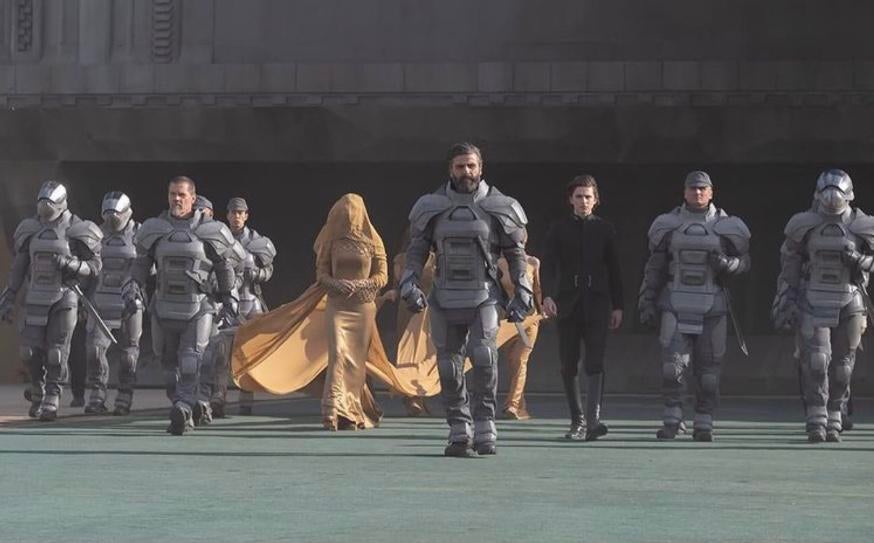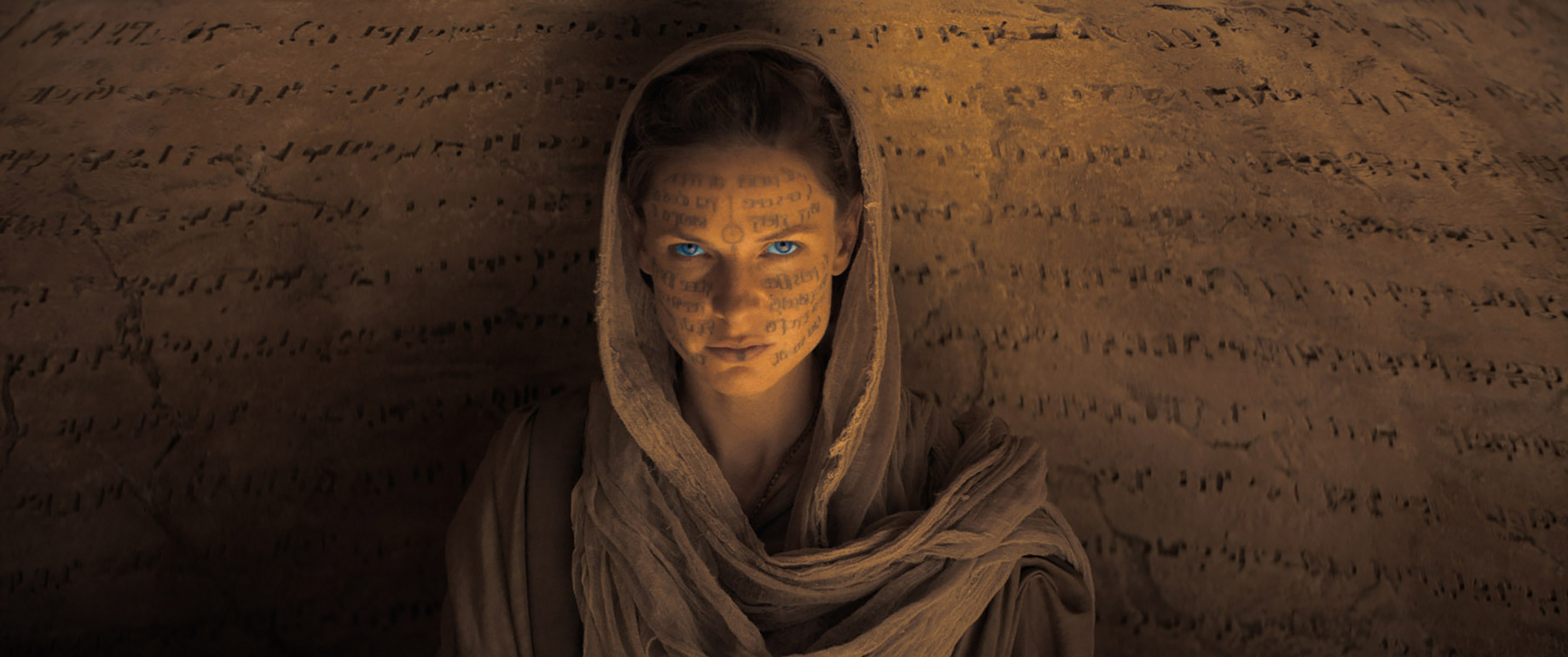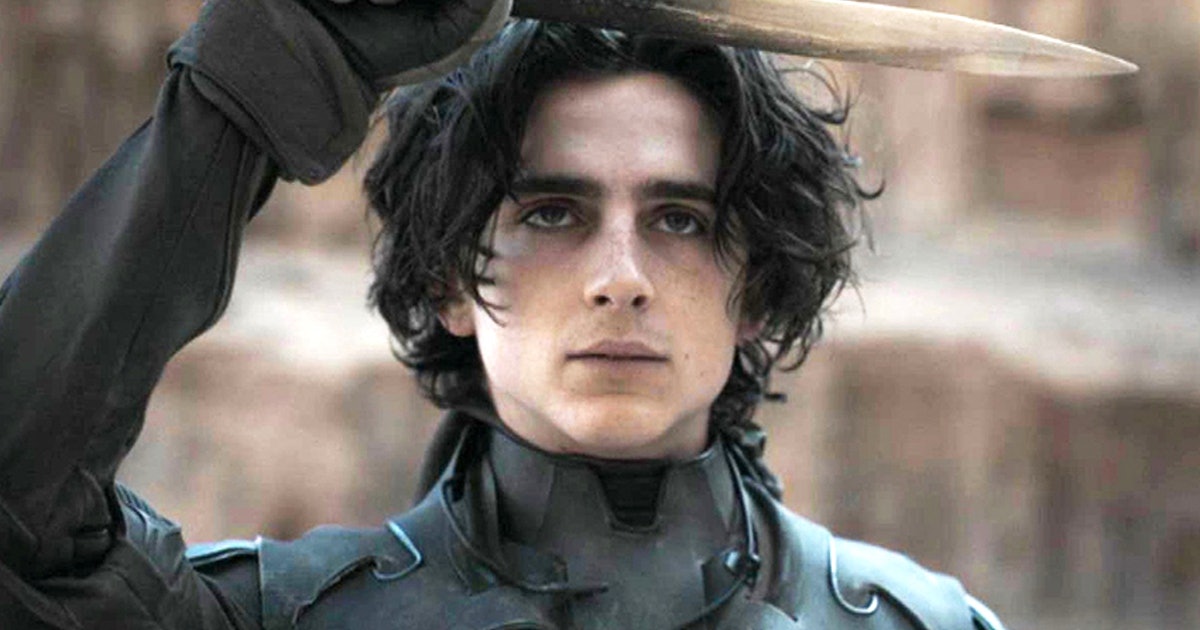Largely due to David Lynch’s 1984 production, Frank Herbert’s Dune has acquired an undeserved reputation for being uniquely difficult to adapt. It is true that there is quite a lot of context which needs to be established for an adaptation to make sense to people who have not read the novel. Dune has been unflaggingly popular since its release, and although the book is not without its flaws, it deserves its reputation. It’s an archetypal adventure story set in a universe where the technology, the political arrangements, even the ecology, all feel perfectly internally consistent. Herbert’s great accomplishment was to craft a space opera which is at once alien and recognisably human.
Dune is set in the far future, telling the story of a young man, Paul Atreides (Timothee Chalamet), who is the heir to one of the ruling Great Houses of the galaxy. At the beginning of the story, his father, Duke Leto (Oscar Isaac), has just been granted a new fiefdom by the Emperor, the desert planet Arrakis. Arrakis is the most valuable planet in the galaxy because it is the only source of the drug “spice,” which grants long life and makes interstellar travel possible.
House Atreides’ ancestral rivals, House Harkonnen, were the former occupants of Arrakis. Duke Leto knows that he is entering a trap set by the Emperor and the Baron Harkonnen (Stellan Skarsgard), but he still accepts the charge, out of a sense of duty and, possibly, foolhardiness. He hopes to enlist the planet’s indigenous inhabitants, the Fremen, as warriors against the Harkonnens.
Alongside the political machinations is another story of a generations-long plan by the female order of the Bene Gesserit, to create the superhuman Kwisatz Haderach through selective breeding programs. Paul’s mother, the Lady Jessica (Rebecca Ferguson), is a member of the Bene Gesserit and at the start of the film it is established that Paul is a potential Kwisatz Haderach, which is why he has seemingly prophetic dreams of leading a genocidal religious war across the galaxy.
There’s a lot more going on than this in the book, but Denis Villeneuve establishes the setting with remarkable economy. Dune is very much focused on the spectacle, and I don’t mean that as a criticism – visually, the film is genuinely amazing. Every shot looks like the cover of a 1970s science fiction novel. Most importantly, there is an incredible sense of scale to everything, and the film perfectly captures the crushing heat of Arrakis. The desert becomes a genuinely frightening place – the sequence where a spice harvester is devoured by one of the planet’s sandworms really does feel like the novel come to life.
Naturally, however, with so much of the film taken up with gorgeous imagery, other aspects are sacrificed. The novel features a lot of dialogue, but there isn’t much conversation at all in this movie, which deadens the life of the novel somewhat. The Baron Harkonnen, for instance – a very talkative character in the book – becomes mostly a sinister visual presence in this film, a gruff, levitating, ogre-like figure. It works in this case, and Stellan Skarskgaard is fantastic.
Other changes from the source material feel less deft. For instance, the novel’s complicated relationship between Leto and Jessica becomes a bit of a non-event in the adaptation. Jessica in particular is one of the more mishandled characters – she’s much more fretful and emotional than the novel’s aristocratic superhuman. With that being said, the casting of this film is unimpeachable. Timothee Chalamet is perfect as Paul, callow yet possessing a sense of unshakable destiny, and not particularly sympathetic.
And most importantly, the film hits all the broad brushstrokes. One of the unique things about the novel is that it depicts a science fiction universe in which religion is still one of the governing forces of people’s lives – and not fantastical religions, but religions which have recognisably developed from the faiths of our own world. In order to survive, Paul embraces the role of the Fremen’s Mahdi, their Messiah who will deliver them from foreign invaders and bring water to Dune – although he knows that this belief has been deliberately sown amongst the Fremen by the Bene Gesserit in preparation for just such an eventuality. There are some predictable concessions – in the novel, Paul foresees himself leading the Fremen in a jihad, not a generic holy war – but otherwise this vital element of the novel has its proper prominence in the movie.
The decision to split the novel up into two films, with the second due in 2023, was a good one – in its full scope, the novel can only work as a five-hour monstrosity. With that being said, many of the novel’s events are being backloaded to the second movie. The film never quite loses its momentum, and the climax is excellent, but I do wonder whether its choice to eschew character for spectacle – particularly as regards the Harkonnens – might cause some issues for the second instalment. A key character, Feyd-Rautha, the Baron’s nephew, is excluded altogether, and given his importance in the novel’s finale, I’m curious to see how he will be introduced. Nevertheless, Dune really is a success in itself, evoking a real sense of awe and grandeur, and paying suitable homage to the source material.
Dune is currently playing in cinemas.



